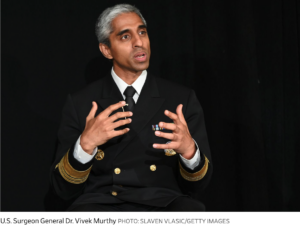
The U.S. Surgeon General and I are on the same page. Recently I warned about the dangers of smart phones to our youth (Smart Phones Destroying Our Youth). This week Dr. Vivek Murthy, the U.S. Surgeon General agreed.
Dr. Murthy has called for warning labels on social-media platforms, saying urgent action is needed to address a mental health emergency involving young people. Gareth Vipers, writing in The Wall Street Journal, tells us Dr Murthy says warning labels, similar to those on alcohol and tobacco products, should accompany platforms to “regularly remind parents that social media has not been proved safe,” in an op-ed for The New York Times.
Murthy cited research showing that social media was an important contributor to a growing mental-health crisis among young people. “Adolescents who spend more than three hours a day on social media face double the risk of anxiety and depression symptoms, and the average daily use in this age group, as of the summer of 2023, was 4.8 hours,” Murthy said.
Four point eight hours! If you sleep eight hours, that leaves 16 hours for an average day awake. These young people are spending more than 25% of their waking hours on social media! Is there any wonder we have a problem?
The surgeon general didn’t name any social-media companies in the article. TikTok, Snapchat, X and Meta Platforms, which owns Facebook and Instagram, didn’t immediately respond to requests for comment.
Murthy has long warned of the risks of social media to young people, urging policymakers and technology companies to increase safeguarding efforts and strengthen standards for younger users. “We are in the middle of a national youth mental health crisis,” he said in a report published last year. “I am concerned that social media is an important driver of that crisis—one that we must urgently address.”
The report pointed to several studies examining a range of adverse effects of social media on adolescents. Those include online harassment, increased exposure to content related to self-harm and racism, and negative impacts on sleep, body image and physical activity.
The Wall Street Journal’s Facebook Files series in 2021 showed internal research at the company found Instagram was harmful for a percentage of young users, primarily teenage girls with body-image concerns. The research reviewed by the Journal showed the platform made body-image issues worse for a third of teenage girls. Facebook, which became Meta in 2021, scrapped plans to create an Instagram platform tailored to children after lawmakers and others raised concerns over the popular app’s impact on young people’s mental health.
Government officials, lawmakers and technology companies have for years grappled with how best to manage the issue. Lawmakers in the U.S. and Europe are weighing plans to tighten online age restrictions. Last year, Utah Gov. Spencer Cox, a Republican, signed a law requiring social-media companies to verify users are 18 years or older, and require those under age 18 to receive the consent of a parent or guardian to open an account.
It is encouraging to see our U.S. Surgeon General take a stand on this issue of great significance to the health of our youth. Perhaps his action will give parents the motivation and encouragement they need to set standards for their children and enforce them.

